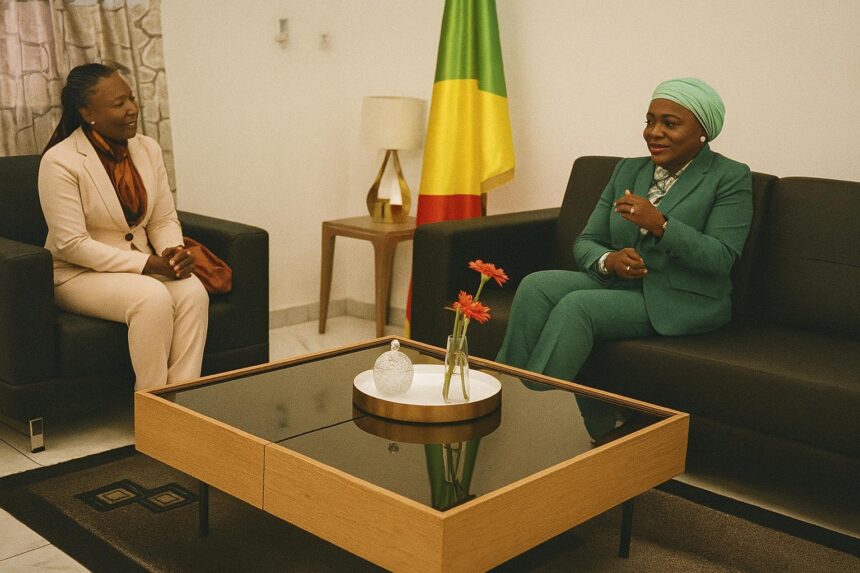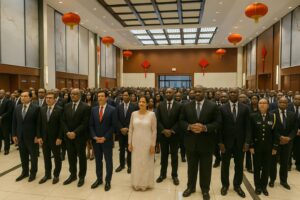Historic Ties Cast Off for Broader Horizons
The Republic of Congo and the Bolivarian Republic of Venezuela share a diplomatic trajectory anchored in energy solidarity since the late 1980s, when OPEC fora offered a discrete yet productive meeting ground for Brazzaville and Caracas. Both countries have weathered cyclical oil shocks while maintaining an unspoken commitment to mutual support, a fact underscored by President Denis Sassou Nguesso’s recurrent consultations with successive Venezuelan administrations. Recent conversations in Brazzaville between Minister Ingrid Olga Ghislaine Ebouka-Babackas and Ambassador Laura Evangelia Suárez mark a calibrated shift: hydrocarbons will remain central, yet maritime commerce now beckons as an additional vector of strategic convergence.
Energy Diplomacy Meets the Blue Economy
According to the OPEC Annual Statistical Bulletin 2023, crude exports still account for more than ninety per cent of Venezuelan foreign revenue, while Congo’s hydrocarbon sector contributes close to fifty per cent of GDP. Both capitals therefore recognise the imperative of cushioning fiscal exposure by investing in auxiliary segments of the value chain, notably shipping and maritime services. Diplomatic advisers in Brazzaville hint that a joint venture fleet could be structured around medium-range tankers and multipurpose cargo vessels, enabling each country to reduce chartering costs and exercise greater sovereign control over logistics. The approach mirrors precedents set by other South-South arrangements, such as the Brazil-Ghana partnership in coastal cabotage (UNCTAD Review of Maritime Transport 2022).
Port Infrastructure and Pointe-Noire’s Gateway Ambitions
The deep-water port of Pointe-Noire, long considered Congo’s most valuable coastal asset, recorded an eight per cent throughput increase in 2022, largely driven by mineral and timber exports (African Development Bank Port Performance Report 2023). Officials now entertain the prospect of designating a specialised Venezuelan berth for trans-Atlantic shipments. Venezuelan engineers, seasoned in the expansion of Puerto Cabello, could contribute technical know-how to dredging operations, quay reinforcement and digital traffic management. In return, the Port Authority of Pointe-Noire would grant preferential docking fees for Venezuelan-flagged vessels carrying refined products and agrifood imports, thereby weaving a pragmatic reciprocity into the memorandum under preparation.
Human Capital and Nautical Competence
Beyond steel and concrete, maritime cooperation ultimately rises or falls on trained personnel. The Congolese Merchant Marine Academy, freshly rehabilitated with Japanese support, currently graduates fewer than seventy officers per annum, while the national requirement for certified deck officers is estimated at two hundred. Ambassador Suárez proposed an exchange programme enabling Congolese cadets to undertake sea time aboard PDV Marina vessels, an offer warmly received by Minister Ebouka-Babackas. In parallel, Venezuelan maritime universities are reviewing curricula to incorporate francophone navigation standards, a move that would foster bilingual competence and enhance mutual recognition of certificates in line with the International Maritime Organization’s STCW convention.
Geopolitical Nuance in a Multipolar Seascape
Observers in Addis Ababa and Geneva note that the budding Congo-Venezuela maritime axis arrives at a delicate juncture for global shipping. The Red Sea disruptions and an increasingly congested Gulf of Guinea invite medium-sized powers to hedge logistical risk by diversifying routes and partners. For Brazzaville, collaborating with Caracas amplifies diplomatic bandwidth without antagonising traditional allies such as France or the United States; for Caracas, it demonstrates continued outreach beyond the Bolivarian Alliance in the face of continuing sanctions pressure. As one senior Congolese diplomat remarked, “The ocean offers a neutrality that land corridors seldom guarantee.”
Financial Engineering and Risk Mitigation
Structuring a bi-national merchant fleet inevitably raises questions of finance in an era of tightened credit lines for emerging markets. Conversations with regional bankers suggest an interest in blended-finance packages combining an initial equity tranche from the Congolese Sovereign Fund, export-credit guarantees from Caracas and possible green-shipping grants from multilateral climate facilities. While negotiations remain embryonic, both sides appear intent on insulating the project from exchange-rate volatility by denominating long-term charters in a currency basket, a mechanism already tested in West African LNG projects (IMF Regional Economic Outlook 2022).
Charting the Course Ahead
As working groups convene ahead of the inaugural Congo-Venezuela Joint Commission later this year, the maritime portfolio has emerged as the most concrete deliverable on the agenda. Analysts caution that success will hinge on phased implementation, transparent governance and the avoidance of duplicative infrastructure. Yet the political resolve displayed in Brazzaville suggests a shared conviction that a modest fleet today can mature into a broader logistics ecosystem tomorrow. In the words of Minister Ebouka-Babackas, “Seafaring nations are not defined by geography alone; they are defined by their capacity to look beyond the horizon.” That horizon, for Congo and Venezuela alike, now stretches well beyond oil platforms toward the restless yet promising waters of trans-Atlantic trade.




















